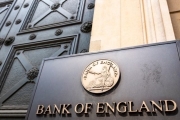

The Bank of England today increased its base rate by 50 basis points to 5% – twice the increase expected.
The increase from 4.5% pushes the base rate to its highest level for 15 years.
The rise is seen as part of the Bank of England’s increasingly challenging battle to curb inflation, still running at a historically high level of 8.7%.
The latest rise is the 13th in a row, with the rate climbing steadily over the past 18 months since December 2021 when it was 0.1%.
The Bank’s Monetary Policy Committee, which voted 7-2 to increase the rate by 50 basis points, said that its inflation target would remain at 2% and it would not rule out further rises to try to force down inflation if necessary.
Mortgage and savings rates are expected to rise following the increase.
While seven members of the MPC voted for the increase, two members preferred to maintain the Bank Rate at 4.5%, suggesting some difference of opinion on the speed and scale of rate rises.
In its report today, the MPC said that since its last meeting in May gilt yields have risen materially, particularly at shorter maturities, suggesting a path for the Bank Rate that averages around 5½%.
The Committee says it is continuing to monitor closely the impact of the significant increases in the Bank Rate.
{loadposition hidden2}
The MPC cited stubbornly high inflation as one factor in its decision making, however it added that CPI inflation was expected to “fall significantly further” during the course of the year, reflecting falling energy prices.
Core goods CPI inflation is expected to decline later this year, supported by developments in cost and price indicators earlier in the supply chain.
The MPC said: “The MPC’s remit is clear that the inflation target applies at all times, reflecting the primacy of price stability in the UK monetary policy framework. The framework recognises that there will be occasions when inflation will depart from the target as a result of shocks and disturbances. Monetary policy will ensure that CPI inflation returns to the 2% target sustainably in the medium term.”
“The MPC will continue to monitor closely indications of persistent inflationary pressures in the economy as a whole, including the tightness of labour market conditions and the behaviour of wage growth and services price inflation. If there were to be evidence of more persistent pressures, then further tightening in monetary policy would be required. The MPC will adjust Bank Rate as necessary to return inflation to the 2% target sustainably in the medium term, in line with its remit.”
Alexandra Loydon, director of partner engagement and consultancy at wealth manager St James’s Place, said: “Having sustained higher interest rates should encourage saving rather than spending, but it’s proving a challenge, both to curb spending and for companies to resist higher than inflation pay rises.”
Robert Jeffree, chief executive of Omnis Investments, said the Bank was under pressure to impose a big increase today.
He said: “After May’s hot inflation report, the Bank of England faced a dilemma when it came to its interest rate decision today. They can’t risk letting inflation expectations get higher and the worrisome acceleration of prices in the service sector risks just that, even if goods prices are falling. But after the most rapid increase in interest rates since the late 1980s, millions of people are already facing a remortgaging cliff which has now become even harder to navigate.
“Having said that their policy is now more data dependent, the Bank had to deliver a rate increase. A greater step change – 50bp rather than 25bp suggests a more discernible hawkish tilt which is bad news for borrowers and good news for savers.”
Richard Carter, head of fixed interest research at Quilter Cheviot, said: “Following yesterday’s shock inflation reading, it has clearly spooked the Bank of England into taking more drastic action than predicted with a 50bps increase in interest rates. Until inflation begins coming down to more palatable levels the Bank of England will continue to put the brakes on the economy and as such the UK once again finds itself staring down the barrel of interest rate rises and economic strife.
“It is perhaps becoming clearer that due to the UK’s more unique set of economic circumstances, recession may be the only option to bring inflation down. While the UK avoided recession at the turn of the year, it does not mean one is not lurking further down the tracks.”
Luke Bartholomew, senior economist, Abrdn, said: “While some investors had been speculating about the risk of a 50bps increase today, this decision will come as a shock for many in the market.
“The risk for the Bank of England in causing such a surprise is they end up looking panicked and increase uncertainty about the likely future path of interest rates. However, policy makers clearly feel that the recent run of inflation data has been ugly enough to warrant such a large move to try to keep a lid on inflation expectations.
“It is increasingly difficult to see how the UK avoids a recession as part of the process of bringing inflation down. And today’s large rate increase will probably be seen in retrospect as an important milestone towards that recession.”
• The next Bank base rate decision will be announced on 3 August.
{loadmoduleid 444}
Leave a Reply